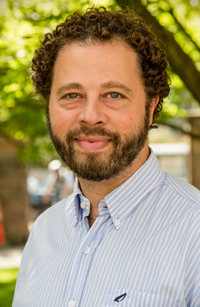Martin Pessah appointed professor of theoretical astrophysics
Martin Pessah has been appointed professor of theoretical astrophysics at the Niels Bohr International Academy at the Niels Bohr Institute, University of Copenhagen.

Martin Pessah has been appointed professor of theoretical astrophysics at the Niels Bohr International Academy at the Niels Bohr Institute, University of Copenhagen.
Martin Pessah researches the fundamental processes in the formation of planets, stars and black holes. The object of the research is to understand the physical processes taking place in the rotating disks of gas and dust that circulate around newly formed stars, where the matter in the rotating disks collects and forms planets. There are also rotating disks of gas around dead stars like white dwarfs, neutron stars and black holes and understanding the complicated structure and evolution of these disks has been a problem in astrophysics for decades.
A budding researcher wonders
This wonder and the quest for answers to the unknown goes back to his childhood in Argentina, where he can remember that he stood on the balcony and looked up at the sky and asked why the Earth rotates? None of the adults could answer the question – not even the teachers in the school. ‘
In upper secondary school, he wanted to understand how atoms work, but the chemistry teacher could not explain it. “It dawned on me that if I wanted the answer to all of my questions and find out how nature works, I would have to study physics,” explains Martin Pessah, who grew up in Buenos Aires, but in order to study astrophysics, he had to move and study at the University of La Plata, where he received his Masters degree in 2000.
He realised that if he wanted to have a career in astrophysics, he would have to go abroad and he therefore moved to the United States to get a PhD at the University of Arizona. Then in 2007 he was hired by one of the most prestigious institutes in the United States, The Institute for Advanced Study at Princeton in New Jersey.
Intense progress at NBI
In 2010, he applied for a position at the Niels Bohr International Academy at the Niels Bohr Institute and he was the academy’s first astrophysicist – but not for long. For he soon built up his own research group. At first it was just him and a postdoc, but then he managed to get not just one - but as many as three big grants in a single year: A Marie Curie Fellowship, the Villum Foundation’s Young Investor Programme and a large Starting Grant from the European Research Council, ERC.
“It was crazy. We moved to Denmark, we had a son and I got three large grants – all in the course of a year,” explains Martin Pessah. The grants meant that he could expand his research group and he received about 100 applicants for each position. He could pick and choose among top international researchers and the group now has 10 researchers – two PhDs, four postdocs, two assistant professors and two associate professors – in addition to himself, who has now been appointed professor with special responsibilities.

Martin Pessah, Professor mso (with special responsibilities), Niels Bohr International Academy at the Niels Bohr Institute, University of Copenhagen, +45 3532-5312, mpessah@nbi.ku.dk
